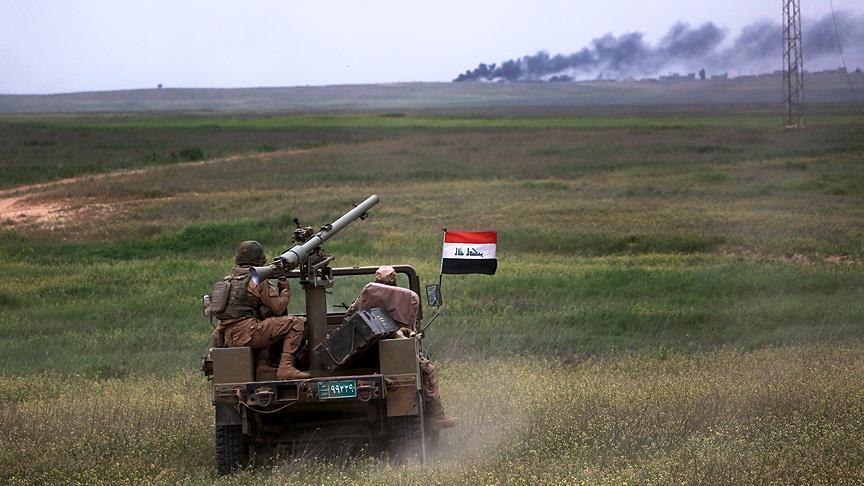Iraq's Khalidiya Island: From Daesh to Shia militiamen
Two years after being captured by Daesh, Iraq’s Khalidiya Island area must now contend with the Shia Hashd al-Shaabi militia

Iraq
By Suleiman al-Qubeisi
ANBAR, Iraq
Last month, Iraqi security forces wrested the Khalidiya Island area in Iraq’s western Anbar province from Daesh more than two years after the terrorist group captured it.
Khalidiya Island was considered one of Daesh’s last remaining strongholds in the region east of Ramadi, Anbar’s provincial capital.
But while local residents had initially celebrated the area’s "liberation", they were soon dismayed by the behavior of the Hashd al-Shaabi militiamen who spearheaded the campaign to rid the area of Daesh terrorists.
Since assuming control of the area, members of the Hashd al-Shaabi -- an umbrella group of Shia militia groups -- have been accused of committing vicious acts of reprisal against local residents.
"Since early 2014, when Iraqi security forces withdrew from Khalidiya Island and allowed Daesh to fill the vacuum, the area had been seen as one of the area’s most important Daesh strongholds," Sheikh Jabbar al-Duleimi, a local notable, told Anadolu Agency.
According to al-Duleimi, Daesh had quickly seized the homes of all officers, security personnel and tribal leaders who opposed the group’s presence and ideology.
In some cases, he said, these homes were looted before being torched.
"After they took control of the area, Daesh killed many of the area’s youth after accusing them of collaborating with the security forces," al-Duleimi recalled.
"So we were heartened to hear that a campaign would be launched with the aim of liberating Khalidiya Island from Daesh," he said.
"But last month we were surprised to hear that the liberation campaign would be led by the Hashd al-Shaabi without the participation of Arab Sunni tribal fighters," he added.
Al-Duleimi went on to say that the operation had kicked off with fierce artillery barrages by the Hashd al-Shaabi, which, he said, "rained down on all areas of Khalidiya Island -- despite the fact that there was very limited resistance by Daesh".
"For reasons we still don’t understand," he added, "Daesh then withdrew from the area, leaving Khalidiya Island to the Hashd al-Shaabi."
Al-Duleimi recalled the mounting anxiety of the local population after Hashd al-Shaabi militiamen began carrying out acts of reprisal against certain residents following Daesh’s withdrawal from the area.
According to al-Duleimi, the Shia militiamen torched a number of homes after emptying them of their contents on the pretext that the homes had been "used by the terrorists".
"But these were our houses," al-Duleimi asserted. "They were never used by terrorists."
- Reprisals
A police official in Anbar told Anadolu Agency -- on condition of anonymity due to restrictions on talking to media -- that Hashd al-Shaabi militiamen had torched "dozens of homes" in Khalidiya Island.
"They were motivated by hatred and the spirit of revenge," he said. "They accused local people of having supported and nurtured Daesh."
Ali Dawoud, head of the Khalidiya City municipal council, for his part, insisted that the Shia militiamen would soon withdraw from the area.
"They will only be here for a few more days," he insisted. "We are in the process of coordinating their withdrawal from the area and handing over security to the Iraqi army, police and [Sunni Arab] tribal fighters."
Major-General Ismail al-Mahalawi, commander of the army’s Anbar Operations, said the Hashd al-Shaabi -- in conjunction with Iraqi security forces -- were still in the process of "clearing" the area of Daesh elements.
He went on to say, however, that the Hashd al-Shaabi "did not loot or torch any homes in Khalidiya Island", insisting that the destruction of local residences had come as the result of "confrontations and clashes between our forces and the Hashd al-Shaabi on one hand and Daesh elements on the other".
Al-Mahalawi added: "Our forces torched the buildings located close to the Euphrates River in which Daesh elements were hiding."
He, too, said responsibility for security in the area would soon be handed over to the Iraqi army and police -- backed by Sunni Arab tribesmen -- "once the area is cleared of Daesh elements".
But even while accounts may differ as to who bears responsibility for the recent destruction, columns of smoke can still be seen rising from dozens of homes in the area that were recently torched.
And while local political figures and the area’s Sunni residents accuse the Shia militiamen of committing rights breaches, the Hashd al-Shaabi itself denies the allegations.
Strategically located on the northern bank of the Euphrates River, Khalidiya Island is a largely agricultural peninsula located in the northern part of Anbar’s Khalidiya district.
Anadolu Agency website contains only a portion of the news stories offered to subscribers in the AA News Broadcasting System (HAS), and in summarized form. Please contact us for subscription options.





